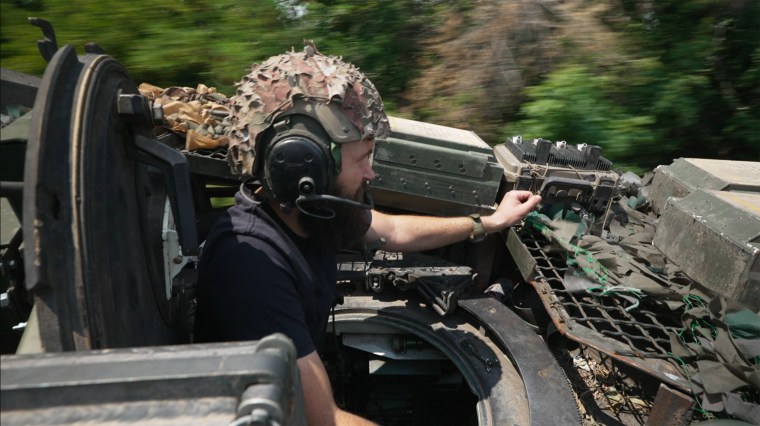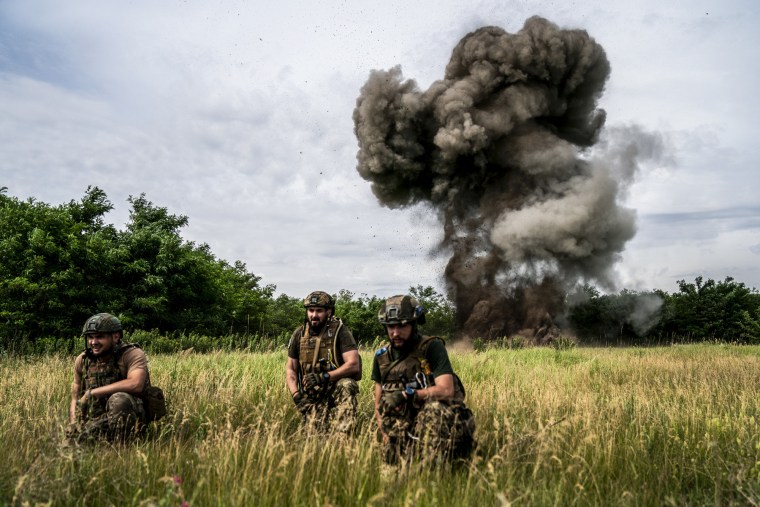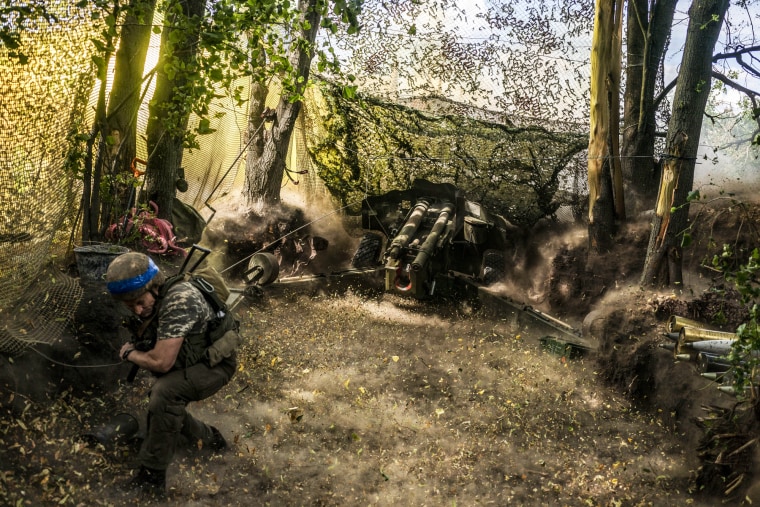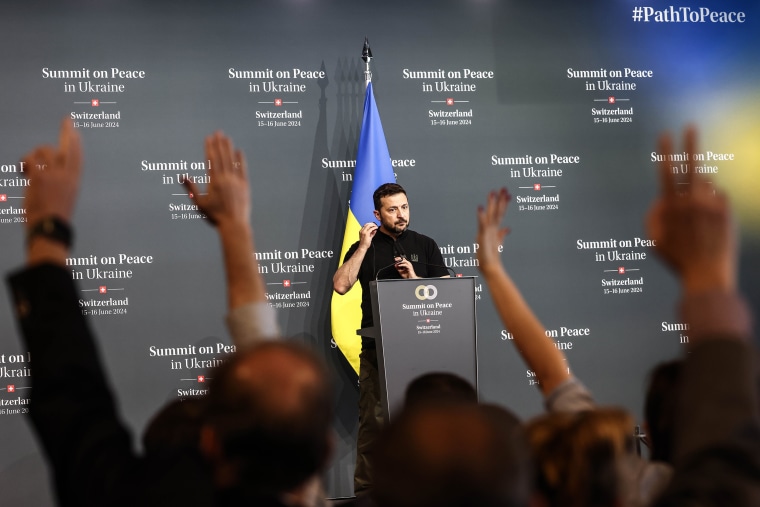DONETSK REGION, Ukraine — For the Ukrainian soldiers battling Russia’s offensive, signs of renewed Western support are more than just diplomatic results.
“I can tell you that your money is not wasted here,” said First Sgt. Dmytro Pryimak, a tank commander in the eastern Donetsk region where Kyiv’s troops are struggling to hold back Moscow’s military.
He spoke to NBC News on the ground from a remote area several miles from the front lines, where Abrams tanks provided by the United States are being repaired and refitted for battle.
“We see all this support that the U.S. and all the other allies are providing to us and we appreciate it. Because you fund us, we can maintain our vehicles, we can buy new equipment and we can protect ourselves,” Pryimak said.
The Kremlin’s forces are pushing forward in a number of hot spots across this industrial heartland, which President Vladimir Putin laid claim to again Friday as he outlined Russia’s demands to begin peace talks.

Ukrainian President Volodymyr Zelenskyy rejected what he said was little more than an ultimatum to give up territory to his country’s invaders. Ukraine has been buoyed by a 10-year security pact and new military aid from the U.S., the loosening of restrictions on its use of Western weapons, and allied support at the G7 summit and then a weekend peace conference.
But with Russia absent from that gathering in Switzerland and some key developing powers declining to sign up to a joint communique, there was little sign of a way forward beyond prolonged war.
‘It will devastate us if we stop now’
Zelenskyy will nonetheless see this flurry of activity as a significant show of support, a galvanized response after months in which his country’s backers seemed to be wavering.
The war’s front lines have scarcely shifted in 18 months, but Ukrainian soldiers say this is only down to their continued fight — and the support they now feel once again in both words and weapons.
Pryimak said the idea that the war had reached a stalemate was an “illusion,” and insisted U.S. aid was helping Ukraine defend ground it would otherwise have lost to Russia.
“Once we cede more territory to Russia, it will not stop,” he added. “We can have some temporary cease-fire, it will last for several months, or for one year or for two years. But in the long run, Russia will come again, more prepared with more equipment, and it will devastate us if we stop now.”

Soldiers like Pryimak are under intense pressure in the east, where a difficult situation has been made dire by Ukraine’s rush to reinforce areas further north after Russia’s military launched a new offensive there earlier this year.
Kyiv’s troops have managed to hold back that advance in the northeastern Kharkiv region, but they too are certain that peace is a long way off.
“If we stop [fighting], we die,” said Georgiy Volkov, commander of a drone unit operating around the key front-line town of Vovchansk. “We can’t stop this fighting because we are fighting for our homeland, for our families,” he said.
“For me, a single peace agreement can be if they leave all territories,” Volkov said, adding that Russia should pay Ukraine to rebuild its villages and cities.

Drafts and divisions at peace summit
While the soldiers were steeling themselves to put allied support to use on the battlefield, Ukraine’s leader was able to call on diplomatic backing at a summit billed as a first step toward peace.
World leaders and officials — Vice President Kamala Harris led the U.S. delegation — gathered at the Alpine resort of Bürgenstock for the two-day conference.
A joint communique signed by nearly 80 countries Sunday called for Ukraine’s “territorial integrity” to be the basis of any agreement and outlined three key principles for a deal to end the war.
With Russia not invited, Putin offered his own demands Friday.
He promised to “immediately” order a cease-fire and begin negotiations if Ukraine started withdrawing troops from the four regions newly annexed by Moscow and renounced plans to join NATO. Ukraine rejected the plan as “manipulative,” “absurd” and a ploy to undermine the Swiss conference.
But there were signs of discord at the summit, too.
India, Mexico, Saudi Arabia, South Africa and Brazil were among countries that did not sign the final document. Turkey left early and China did not attend.
NBC News has seen a copy of an earlier draft of the joint communique that called for another summit to be held that would include Russia.

That language did not make it into the final draft, which instead focused on more consensus areas, such as the future of Ukraine’s Black Sea ports and nuclear facilities, as well as children deported to Russia.
That left any way forward for diplomatic efforts uncertain, with Ukraine increasingly bullish about its ability to retain allied support and Russia still pressing its offensives in the east and north.
South Africa said that developing countries from the “global south” were taking a less uncompromising stance.
Zane Dangor, director general of South Africa’s Department for International Relations, said there was a route to a diplomatic solution.
Putin had put forward “maximalist demands” that could be watered down if both sides agreed to sit down for peace talks, he said in an interview in Switzerland.
“Negotiations will always begin by both parties putting the maximum demands,” he said.
You don’t get to peace through war, Dangor added, “all you are doing is building the basis for the next war.”
Richard Engel and Marc Smith reported from Donetsk, Natasha Lebedeva from Bürgenstock, Switzerland, Keir Simmons from Beirut, and Freddie Clayton from London.

